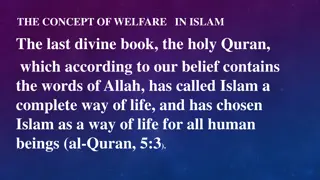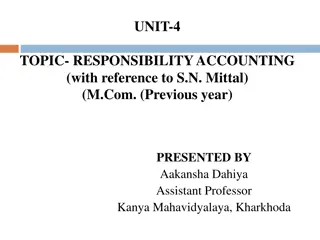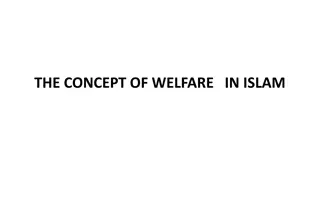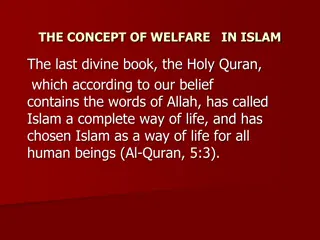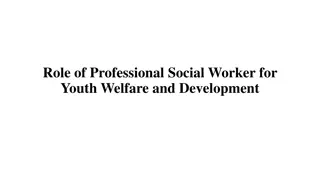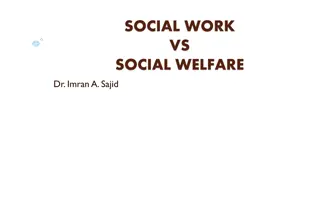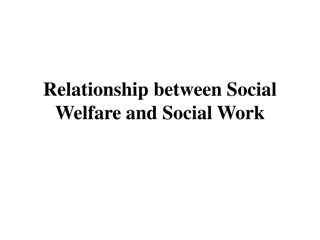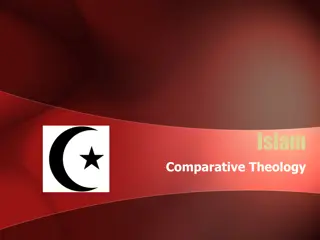Welfare System in Islam: Principles and Social Responsibility
Islam emphasizes serving humanity alongside worshipping Allah. It introduced the concept of a welfare state where social justice, mercy, and support for vulnerable groups are integral. The teachings advocate charity, mutual responsibility within families, and societal welfare through acts like Zakat. Islamic teachings stress the importance of individual, family, and societal responsibilities, especially towards vulnerable groups like orphans and the poor.
Download Presentation

Please find below an Image/Link to download the presentation.
The content on the website is provided AS IS for your information and personal use only. It may not be sold, licensed, or shared on other websites without obtaining consent from the author. Download presentation by click this link. If you encounter any issues during the download, it is possible that the publisher has removed the file from their server.
E N D
Presentation Transcript
All the teachings of Islam are based on two principles; worship of Allah and serving to humanity. Without putting both of these principles into practice, there can be no true fulfillment of one s religious duties. Islam presented the first ever concept of welfare state. In Islam, sovereignty lies only with ALLAH. Islam secures rights of all segments of society. It commands its followers to do Falah for entire human society. It emphasizes social justice, mercy, forgiveness, sacrifice( eesaar) and fulfillment of rights with responsibility. It secures the rights of poor through zakat and Ahsaan. It also commands to support the weaker sections such as orphans, windows, old aged and disabled.
All human beings, according to Islam, have been created by one and the same God ; and for this reason, they belong to one great brotherhood . Charity, an important way of bringing justice to society, has been preached by every religion of the world. A society can flourish only when its members do not spend all their own desires, but reserve a portion of it for parents, relatives, neighbours, the poor and the needy. Charity in its broadest sense, has been called Sadaqa in Islam. Zakat , fitrana, usher etc are also forms of charity . Islam provides a holistic approach of social welfare.
Social Responsibility In Islam In Islam individual members of society work together to fulfill the general needs of society as well as the individual needs of its members. Each member of society has rights and also has responsibilities towards others. Responsibility to oneself Every person is responsible for himself. He is responsible to keep himself pure, cultivate good manners, reform his faults, do good, and refrain from evil. Responsibility to one s family Islam stresses mutual responsibility between family members, making it the solid foundation that protects the family collapsing or splitting apart.
Responsibility to society Islam makes responsible for each other. The individual responsible to help in preserving the general order and to refrain from any behavior that could harm society or work against its interests. the individual and society in Muslim society is
Vulnerable Groups Responsibility towards children and orphans Islam stresses caring for small children and requires parents to care for and raise their children until they reach the age of discretion and are able to lead independent lives. When children lose their parents, the responsibility to care for them is transferred to other close relatives who are able to do so. In the absence of relatives, the responsibility falls on society and state. Responsibility towards the poor and the destitute Islam encourages voluntary acts of good to help the poor while simultaneously prescribing the mandatory Zakah tax to ensure that society takes complete responsibility over those who cannot find work and do not have resources to fulfill their needs.
Responsibility towards the elderly Islam pays special attention to the elderly. It considers them to have a right to be cared for in repayment for the sacrifices that they have made to ensure the prosperity of the generation that they raised and nurtured.
Measures Employed by Islam Islam has made charity obligatory and binding upon all those who embrace the faith, laying the greatest emphasis on the support of the needy and destitute members of society. It is thus a sacred duty of the affluent to give part of their wealth to fulfill the needs of deprived members of the community. A true believer, after meeting the needs of his family, is thus always prepared to assist other people in need of his help. There are two forms of charity in Islam obligatory and voluntary.
These are as following: Zakah tax Allah has made it a religious obligation upon the Muslims and has empowered the state to collect it forcibly if necessary. The law of Zakat, i.e. to take from the wealthy and give to the poor, rotates wealth in such a way as to balance social inequality. Zakah is one of the five pillars of Islam. Zakah is eligible upon mature, sane men and women who meet Nisab threshold. It is a contribution paid once a year on savings of 2.5% of their wealth. Zakah is not just a duty on those with wealth, but a right that the poor have over us.
Sadaqa Charity, in its broadest sense, has been called Sadaqa in Islam. According to the teachings of Islam, the giving of Sadaqa serves a number of functions. Sadaqa, first and foremost, acts as expiation for sins. Sadaqah (giving in charity) can refer to a variety of acts which bring joy or benefit to others e.g. smiling at someone, speaking a kind word, helping them or removing harm from their way but the word is most commonly used to refer to charitable giving in Islam.
Wakf Wakf is a permanent form of charity which is called sadaqa jaria. This is to allot something as a trust for a certain cause. This can be during one's lifetime or bequeathed in one's will. When executed, the donation becomes the property of Allah (and thus has specific rules regarding it), and its beneficiaries are to remain those named as the cause (e.g. the poor, orphans, students, the people of a certain locality, etc.)
SadqahAl-Fitr This is a compulsory form of charity which must be given before Eid-ul-Fitr prayer.







